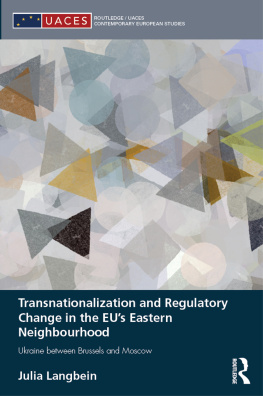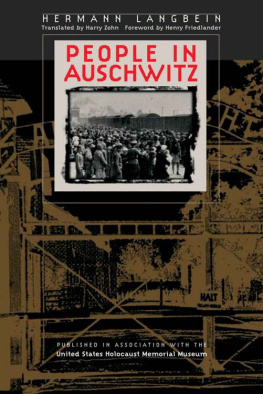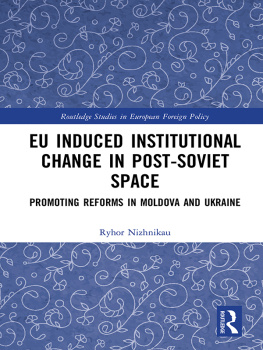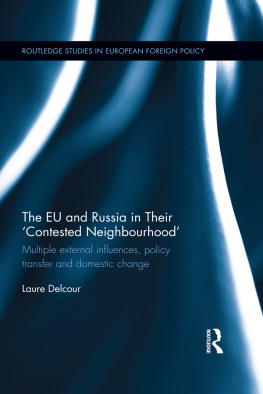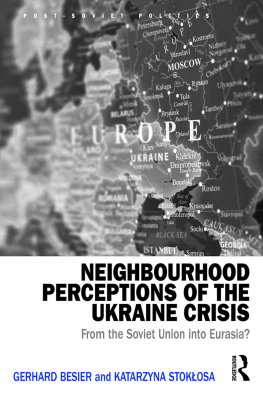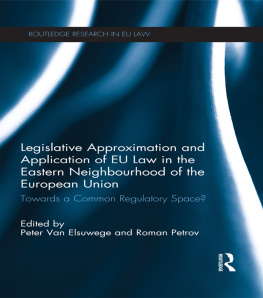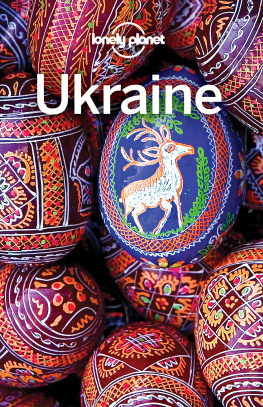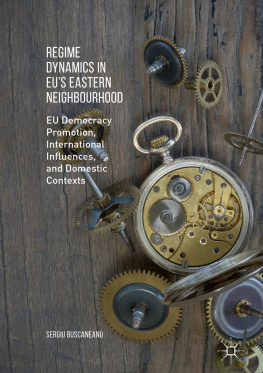Langbeins fascinating new book is the first to treat systematically the European Union and Russia as truly duelling regulatory forces. Focusing on a case study of Ukraine, she provides a nuanced picture of when and where regulations converge with either EU or Russian preferences. Her focus on domestic empowerment is especially welcome.
Wade Jacoby, Mary Lou Fulton Professor of Political Science, Brigham Young University, USA.
This is a highly relevant and timely book, an important contribution to the literature of transnational market making. By exploring various patterns of transnationalization in the Ukrainian economy, the book offers clear and sharp analytical tools to understand the links between regulatory convergence, economic development and regional stability. A must read for students of the political economy of Europeanization in the peripheries of Europe and for everyone who wants a better grasp of the regional dimensions of the present crisis in Ukraine.
Lszl Bruszt, Professor of Sociology, European University Institute, Italy.
This book is a timely reminder that behind the scenes of the battle for territory and influence unfolding in Eastern Ukraine, global competitive pressures and domestic regulatory capacity building play an important role in determining Ukraines convergence with European Union standards.
Antoaneta L. Dimitrova, Associate Professor, Institute of Public Administration, Leiden University, The Netherlands.
Julia Langbeins Transnationalization and Regulatory Change in the EUs Eastern Neighbourhood is an excellent and lucid account of institutional change in post-communist Ukraine. It is a first class study of regulatory change and its sources in areas far away from the gaze of most of the scholars of European Union and comparative regulation and transnationalization. I expect this rigorous and theoretically rich study to serve as an authoritative account of regulation and transnationalization and as an example to follow in the study of other sectors, issues, countries and eras.
David Levi-Faur, Professor at the Federmann School of Public Policy and the Department of Political Science, The Hebrew University of Jerusalem, Israel.
Transnationalization and Regulatory Change in the EUs Eastern Neighbourhood
Regulatory reforms in the EUs Eastern neighbourhood countries are not as sluggish as often perceived. Rule enforcement is happening despite the presence of domestic veto players who favour the status quo, the lack of EU membership perspective and the presence of Russia as an alternative governance provider.
Using Ukraine as a primary case study, this book examines why convergence with transnational market rules varies across different policy sectors within the Eastern neighbourhood countries. It analyses the drivers of regulatory change and explores the conditions under which post-Soviet economies integrate with international markets. In doing so, it argues that the impetus for regulatory change in the Eastern neighbourhood lies in specific strategies of domestic empowerment applied by external actors. Furthermore, through the study of the impact of Western and Russian transnational actors, the book concludes that Russias presence does not necessarily hinder the integration of the EUs Eastern neighbours with international markets. Instead, Russia both weakens and strengthens domestic support for convergence with transnational market rules in the region.
This book will be of key interest to students and scholars of European/EU studies and international relations, especially in the areas of regulatory politics, transnational governance, public policy, and post-Soviet transitions.
Julia Langbein is Senior Research Fellow at the Center for European Integration at Freie Universitct Berlin, and Scientific Coordinator for the FP7 research project Maximizing the Integration Capacity of the European Union (MAXCAP). Her research interests include European integration and the comparative political economy of Eastern Europe.
Routledge/UACES Contemporary European Studies
Edited by Federica Bicchi, London School of Economics and Political Science, Tanja Brzel, Free University of Berlin, and Mark Pollack, Temple University, on behalf of the University Association for Contemporary European Studies
Editorial Board: Grainne De Brca, European University Institute and Columbia University; Andreas Fllesdal, Norwegian Centre for Human Rights, University of Oslo; Peter Holmes, University of Sussex; Liesbet Hooghe, University of North Carolina at Chapel Hill, and Vrije Universiteit Amsterdam; David Phinnemore, Queens University Belfast; Ben Rosamond, University of Warwick; Vivien Ann Schmidt, University of Boston; Jo Shaw, University of Edinburgh; Mike Smith, University of Loughborough and Loukas Tsoukalis, ELIAMEP, University of Athens and European University Institute.
The primary objective of the new Contemporary European Studies series is to provide a research outlet for scholars of European Studies from all disciplines. The series publishes important scholarly works and aims to forge for itself an international reputation.
1 The EU and Conflict Resolution
Promoting peace in the backyard
Nathalie Tocci
2 Central Banking Governance in the European Union
A comparative analysis
Lucia Quaglia
3 New Security Issues in Northern Europe
The Nordic and Baltic states and the ESDP
Edited by Clive Archer
4 The European Union and International Development
The politics of foreign aid
Maurizio Carbone
5 The End of European Integration
Anti-Europeanism examined
Paul Taylor
6 The European Union and the Asia-Pacific
Media, public and elite perceptions of the EU
Edited by Natalia Chaban and Martin Holland
7 The History of the European Union
Origins of a trans- and supranational polity 195072
Edited by Wolfram Kaiser, Brigitte Leucht and Morten Rasmussen
8 International Actors, Democratization and the Rule of Law
Anchoring democracy?
Edited by Amichai Magen and Leonardo Morlino
9 Minority Nationalist Parties and European Integration
A comparative study
Anwen Elias
10 European Union Intergovernmental Conferences
Domestic preference formation, transgovernmental networks and the dynamics of compromise
Paul W. Thurner and Franz Urban Pappi
11 The Political Economy of State-Business Relations in Europe
Interest mediation, capitalism and EU policy making
Rainer Eising
12 Governing Financial Services in the European Union
Banking, securities and post-trading
Lucia Quaglia
13 European Union Governance
Efficiency and legitimacy in European commission committees
Karen Heard-Laurote
14 European Governmentality
The liberal drift of multilevel governance
Richard Mnch
15 The European Union as a Leader in International Climate Change Politics
Edited by Rdiger K. W. Wurzel and James Connelly
16 Diversity in Europe
Dilemmas of differential treatment in theory and practice
Edited by Gideon Calder and Emanuela Ceva
17 EU Conflict Prevention and Crisis Management
Roles, institutions and policies
Edited by Eva Gross and Ana E. Juncos
18 The European Parliaments Committees
National party influence and legislative empowerment
Richard Whitaker
19 The European Union, Civil Society and Conflict
Nathalie Tocci

